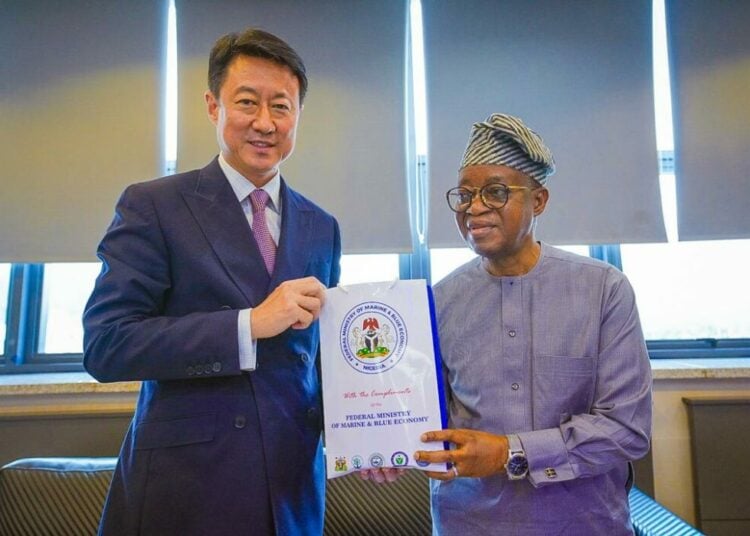The Nigerian government and the People’s Republic of China have agreed to partner on projects and polices for the development of the Nigeria’s Marine and Blue Economy sector.
This was revealed when the Minister of Marine and Blue Economy, Adegboyega Oyetola received the Chinese Ambassador to Nigeria, Yu Dunhai, at the ministry’s headquarters in Abuja.
Welcoming the envoy, Oyetola commended the long-standing bilateral relationship between both countries, describing it as mutually beneficial and pivotal to the economic growth of both nations.
He noted that Nigeria, with its extensive coastline and rich maritime resources was strategically positioned to become a hub for marine trade, logistics, and investment in Africa.
Oyetola spoke extensively about Nigeria’s maritime endowments, highlighting the country’s 853 kilometres of coastline along the Atlantic Ocean, its vast inland waterways spanning over 10,000 kilometres, and the abundant marine biodiversity that supports aquaculture, fishing, and other blue economy activities.
He explained that Nigeria’s maritime domain holds immense potential for shipping, port operations, fisheries, renewable ocean energy, marine tourism, and coastal infrastructure development.
According to Oyetola, the marine and blue economy sector is a frontier for wealth creation, job opportunities, and sustainable development if properly harnessed.
“Our ministry is determined to create the right framework for investment and partnership, and we believe that Nigeria has a lot to learn from China’s marine and blue economy development model,” he said.
Speaking earlier, Ambassador Dunhai said his visit to the ministry was in furtherance of the strong partnership between China and Nigeria.
He recalled that it has been exactly one year since President Bola Tinubu visited China where he met Chinese President Xi Jinping.
Dunhai said the visit produced significant economic benefits for both nations, including deepened cooperation in trade, infrastructure and industrial development.
The Ambassador particularly highlighted the Lekki Deep Seaport, constructed by China Harbour Engineering Company, as a shining example of Sino-Nigerian collaboration.
He noted that the port, Nigeria’s first deep seaport and one of the largest in West Africa was capable of handling ultra-large container vessels and significantly boosting Nigeria’s trade volume.
Dunhai stressed that the project has created thousands of direct and indirect jobs, eased congestion at Lagos ports, ensured faster cargo clearance, and positioned Nigeria as a key maritime hub in West and Central Africa.





